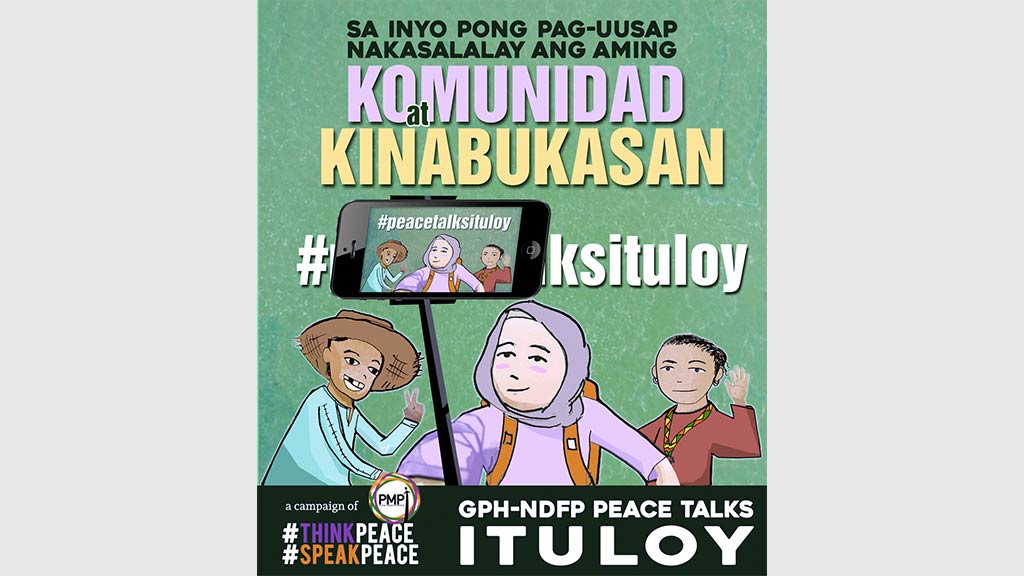THE PATH TOWARDS GENUINE PEACE SHOULD NOT BE DECIDED
BY ONE PERSON OR ONE GROUP ALONE
Go back to the Negotiating Table
Enter into a Bilateral Ceasefire
Listen to Victims of War and other Peace stakeholders in the Negotiation Process
Philippine President Rodrigo R. Duterte during his late-night press-con this week withdrew from the peace talks with the National Democratic Front of the Philippine (NDFP) and expressed wrath over the “unrealistic demands of the NDFP and its purported ceasefire violations.”
In rage, he swore to “drop all the bombs” in areas where the New People’s Army (NPA) operate. Months before, the President swore that he will work towards peace during his term. Now, he shook his head saying peace may not come in this generation.
This reaction from the President, however, is a response to the sudden public announcement by the communist group of its withdrawal of the unilateral ceasefire due to alleged “massive violations committed by the Armed Forces of the Philippines (AFP)” and the reneging of the Government of the Philippines (GPH) of its promise to release all the political prisoners.
The round of talk in Rome brought so much promise and hope that this peace talks is going in the right direction. Thus, we were shocked that after a successful signing of the guidelines for Joint Monitoring Committee (JMC) under the Comprehensive Agreement on Respect of Human Rights and International Humanitarian Law (CARHRIHL), and guidelines for the negotiation of the Comprehensive Agreement on Social and Economic Reform (CASER) and Political and Constitutional Reforms (PCR), the news of withdrawing ceasefire and disengaging from peace talks followed.
We, from the Philippine Misereor Partnership Inc. (PMPI), a faith-based network of peace and development civil society organizations, now ask both parties: how important is “peace” for you? Should peace be in peril because the immediate demands are not met? Should we believe that the goodwill and trust shown by both parties are only part of their respective strategies employed to achieve separate political agenda?
We strongly urge both parties to reconsider their positions and to go back to the dialogue table. Trust-building issues should not deter peace talks from proceeding.
While the economic and political agenda can provide a framework to effect just and lasting peace, we ask that you bring to the center of the dialogue table first and foremost the needs of victims of the long-standing war: thousands of men, women, and children who perished in non-stop battle; innumerable families who lost their home and land; countless children who were unable to find their schools and playground; communities who have grown weary and traumatized to the sounds of guns and bombs; unending numbers of victims that were tortured and killed by both the Armed Forces of the Philippines and the NPA.
Come back to peace table. Enter into bilateral ceasefire.
Peace for all of these people and communities need to be heard. As both parties profess to be the voice and representative of people, we heed you to listen to the voice of the victims of the armed conflict. Address their immediate need while working on the institutional agenda. We ask that a listening process, a transitional justice and reconciliation process be undertaken in conflict-affected communities and make it as integral part of the talks.
We ask for appeal for more openness, trust, and transparency in the dialogue. We dream of dialogue tables that are inclusive, ensuring participation of various stakeholders from the communities, the NGOs, church, academe and even business, AFTER ALL WE ALL ARE YOUR PEOPLE who will eventually benefit or suffer from the outcome of the agreements you both will enter into.
All should take part and own the process. Let peace be decided neither by only one man nor one group alone. Peace is something that we should build altogether. We push to achieve few important first steps to Peace – the silencing of guns no matter how temporary; that no civilians are caught dying in a crossfire; that people are not forced out of their natural communities and into an evacuation centers; and, that farms are steadily tilled by family of farmers who are not afraid to work due to an armed-conflict in their area.
To this end, we reiterate and strongly ask the two parties to go back to the negotiating table: to immediately engage not only in unilateral ceasefire but in a more meaningful bilateral ceasefire where accountabilities of both shall be required. In doing so communities will immediately reap the fruits of the first few important steps to peace. Side by side with these efforts, the big push towards just and lasting peace need be pursued.

